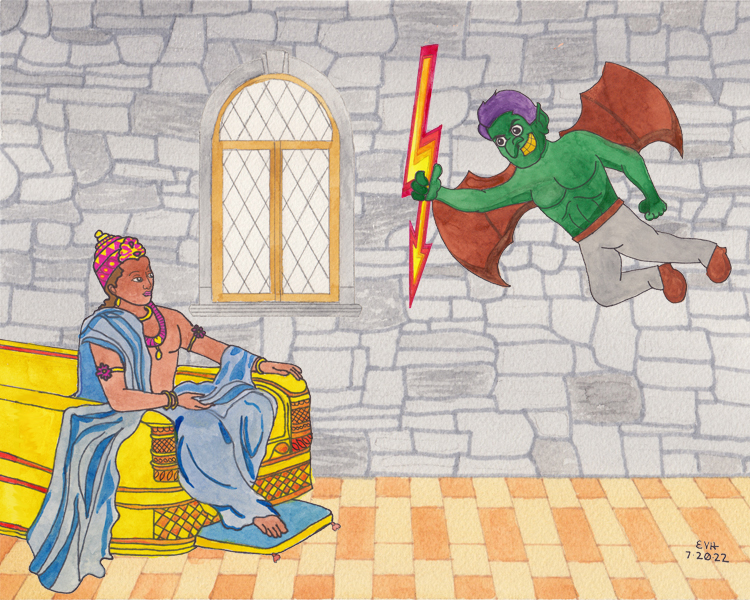
Jataka 347
Ayakūṭa Jātaka
The Story of Ayakūṭa
as told by Eric Van Horn
originally translated by H.T. Francis and R.A. Neil, Cambridge University
originally edited by Professor Edward Byles Cowell, Cambridge University
It is always nice to know that the god of devas has your back.
“Ayakūṭa” is, presumably, the Yakka who was sent to kill our hero.
“Why in midair?” The Master told this story while he was at Jetavana. It is about the importance of doing good. The incident that led to the story will be set forth in the Mahākaṇha Birth (Jātaka 468).
Once upon a time when Brahmadatta was reigning in Benares, the Bodhisatta was reborn as the son of his chief Queen. And when he came of age, he was instructed in all the arts, and on the death of his father he was established in his kingdom and governed it righteously.
At that time people were devoted to the worship of the gods. They made offerings to them by slaughtering many goats, rams, and the like. But the Bodhisatta proclaimed by beat of drum, “No living creature is to be put to death.”
The Yakkhas were enraged at the Bodhisatta for losing their offerings. They called together an assembly of their kind in the Himalayās. They sent forth a certain savage Yakkha to kill the Bodhisatta. He took a huge blazing mass of iron as big as the dome of a house. And thinking to strike a deadly blow immediately after the mid watch (middle of the night), he went and stood at the head of the Bodhisatta’s bed.
But at that instant the throne of Sakka manifested signs of heat. After considering the matter, the god discovered the cause. And grasping his thunderbolt in his hand, he went and stood over the Yakkha. The Bodhisatta—on seeing the Yakkha—thought, “Why in the world is he standing here? Is it to protect me or from a desire to kill me?” And as he spoke with him he repeated the first stanza:
Why in midair, O Yakkha, do you stand
With that huge bolt of iron in your hand?
Are you to guard me from all harm intent,
Or here today for my destruction sent?
Now the Bodhisatta saw only the Yakkha. He did not see Sakka. Out of fear of Sakka, the Yakkha did not dare to strike the Bodhisatta. On hearing the words of the Bodhisatta the Yakkha said, “Great King, I am not here to guard you. I came intending to kill you with this blazing mass of iron. But out of fear of Sakka, I dare not strike you.” And to explain his meaning he uttered the second stanza:
As messenger of Rakkhasas, lo! Here
To compass your destruction I appear,
But all in vain the fiery bolt I wield
Against the head that Indra’s self would shield.
(“Rakkhasas,” or “Rakshasas,” is a demon spirit.)

Figure: Bad, Yakkha. Bad.
On hearing this the Bodhisatta repeated two more stanzas:
If Indra, Sujā's lord, in heaven that reigns,
Great king of gods, my cause to champion deigns,
With hideous howl though goblins rip the sky,
No demon brood has power to terrify.
Let mud-sprite devils prattle as they may,
They are not equal to so stern a fray.
(Indra is a god, and Sujā is Sakka’s wife.)
In this way Sakka put the Yakkha to flight. And exhorting the Great Being, he said, “Great King, fear not. We will protect you. Do not be afraid.” And so saying he returned back to his own place of living.
The Master here ended his lesson and identified the birth: “At that time Anuruddha was Sakka, and I was the King of Benares.”
(Anuruddha was one of the Buddha’s ten chief disciples and his cousin.)
